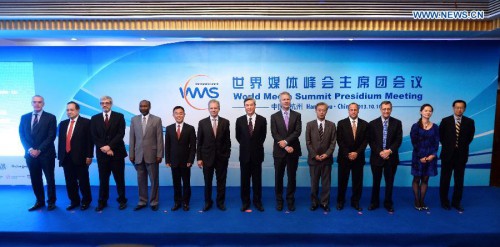China Media Project’s David Bandurski takes a caustic look at this week’s Second Presidium Meeting of the World Media Summit in Hangzhou. The conference is led by Xinhua chief Li Congjun, who last month accused Western media of aiming to demonize and disintegrate China; it is attended but otherwise ignored by organizations including News Corp, The Associated Press, Reuters, the BBC, and Google. Next year’s event will be hosted by The New York Times.
It’s that time of year again. No, I don’t mean the Nobel Prizes. I’m not talking about the International Emmys. It’s time for the World Media Summit.
You know, that buzzing international meeting to carry on serious strategic dialogue about the future of media at the pleasure and expense of China, the country with the world’s most robust system of media controls. Or, as it is better unknown to all, the media event all major global media players attend but none bother to actually cover. Why not? Because under the surface it’s all just a little too disgusting.
[…] To sum up, the World Media Summit, this ostensible back-slapping affair offering an opportunity for media leaders to talk media strategy, is fundamentally about China projecting its influence over global media agendas. Any global media bosses at the summit who do not realize this — though I suspect plenty of them do — are woefully deceived. I want all of you participants at the World Media Summit right now to pick up your complimentary Xinhua News Agency fountain pens and write this on the back of your hand: “I am not here because China really wants to talk about the future of global media. I am here because China wants to channel the future of global media.” [Source]
See also Xinhua’s report on “enthusiastic reactions” to this year’s meeting and, via CDT, Bandurski’s commentary on the 2011 event.








